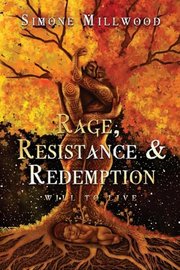“Forcefully Taken,” the fiery opener, describes the harrowing experience of violation and “the weight of oppression, its jealousy and lust.” The speaker endures physical and emotional pain, likening the body to a “diamond under pressure.” “Guineamen” reflects on the brutal history of the trans-Atlantic slave trade. The poet juxtaposes joyful memories of freedom, when “Freewill crowned each step of life— / life was bright as the day once,” with the horrors of enslavement, when “Harvested like maize, / resisting bodies lay lifeless in heaps.” Body language, silence, and the power of words factor heavily into Millwood’s work. In “Kindness for Weakness?” the speaker makes an outward show of agreeability but resents the need to be nice, warning “Do not mistake my kindness for weakness, / nor my silence for acceptance / Within me, lurks the power to pull down your walls of lies / and I will repay the past with modern vengeance.” In a critique of performative allyship, in “Do Not” Millwood writes, “Do not pretend to understand, / when you are part of the problem / by being silent, by downplaying, / by casually dipping your feet in torrid waters.” “Hidden in Plain Sight” is a poetic manifesto that speaks to Black people’s contributions that are often deliberately obscured and praises their resilience: “I am the roots that run through your veins. / I am the ancestors you venerate. / I am the blueprint of your DNA. / I am the face you seek to hide.”
Millwood excels at conveying deep emotional experiences through vivid and evocative imagery. She describes “Great welts cascaded upon my temple, / Tattooing trees strong and ample, / With branches great and wide. Far-reaching” (in “To Never Forget”) and in “Rage” compares Black pain to a festering wound, “Oozing with yellow pus. / Injuries torn open / leaving rotting infection / down to the marrow / of the bone.” Her similes are equally strong, from clothes “discarded like empty wrappers” to how “your entrance is like a cool zephyr.” Millwood’s voice is direct and unapologetic, and she forces readers to confront their own perceptions and misconceptions around Blackness. While the book contains ample rage, it also shows encouragement and pride, as in “Black Gold,” when the poet asserts, “We are Jewels in human form, great beings to behold. / Calm as a summer’s day or as violent as a winter’s storm. / Walking the earth with majesty. / All who see them, bow in awestruck captivity.” Millwood also celebrates Black identities, proclaiming, “My Black is the type of black that brings forth life. / My Black breeds abundance in lack. / My Black is the type of black that calls men to stand as kings. / My Black rocks Earth and makes Heavens shake.” On the downside, the content can get quite gruesome and may be hard for some readers to stomach, like this recounting of a crime in “Little White Lies”: “One night, 2 Men, 1 Child, / Over days, beaten and tortured. / Smashing to a pulp / The child of a proud mother.”

